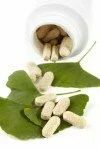 |
Find Your Medication |


New study says ginkgo biloba does not enhance memory or thinking
Those who add a ginkgo biloba supplement to their daily routine might not be getting what they're hoping for.
Regular consumption of the extract from the ancient ginkgo biloba tree has been said to enhance mood, memory, cognitive functions and overall well-being. In fact, the University of Maryland points out that some studies show that a dietary supplement made from the plants originally cultivated in Japan and China could have benefits for individuals who buy Paxil or buy Effexor from a Canadian internet pharmacy. However, if a new study appearing in the journal Human Psychopharmacology: Clinical and Experimental proves correct, those who add a ginkgo biloba supplement to their daily routine might not be getting what they're hoping for. "Ginkgo biloba has been widely used for a number of years to reduce the mental decline associated with aging," said study leader Keith Laws, a professor of psychology at the University of Hertfordshire. "But more recently, it has been marketed as a memory enhancing supplement for healthy individuals - and it is crucial to establish the validity for such claims." Having tested the cognitive functions of more than 1,000 people belonging to every age group in 13 trials, the Hertfordshire scientists say ginkgo biloba had no notable effect on their subjects' mental states whatsoever. It didn't matter how much ginkgo biloba extract they consumed or how long they took it for. More scientists second-guess effectiveness of ginkgo biloba The Hertfordshire study isn't the only research debunking the notion that ginkgo biloba enhances memory. Earlier this month, a study appearing in The Lancet shows that ginkgo biloba had no significant impact on the mental health of a survey group of almost 3,000 seniors who were having memory troubles - the first sign of Alzheimer's onset. "We don't have any proof of efficacy, but there are no dangers in taking ginkgo except that it is not recommended for people taking warfarin or other blood thinners," professor of medicine Bruno Vellas told the New York Times. Over the course of five years, about half the subjects were given either ginkgo biloba or a placebo. At the study's conclusion, 61 of those who took the herbal extract had been diagnosed with Alzheimer's, as opposed to 73 in the placebo group. Gingko biloba didn't appear to have an impact on participants' physical health, either, as instances of stroke, heart attack, stomach problems and other illnesses were more or less equal in both groups. |
See also ...
- AAP statement: Recess key for healthy kids
- Study finds cancer screening rates lower than U_S_ goal
- Study shows keeping emotions bottled up can be unhealthy
- CDC study looks at cardio health of states and healthy participants
- Governor Brown being treated for prostate cancer
- High blood pressure may speed up cognitive aging
- New associations found between depression and heart failure
- Testosterone low in young men with obesity
- This red fruit may boost your health
- Loss of smell linked to neurological conditions
- Science unveils the wandering mind
- Insulin-blocking protein unraveled
- New biomarkers could result in better prevention and treatment for type 2 diabetes
- The battle over BPA wages on
- New research links cell death during cardiac events to calcium overload
- "The Biggest Loser" helps science understand weight loss extremes
- Study finds increased risk of cardiovascular disease with poor diabetes care
- Small amounts of exercise can improve morale of overweight adolescents
- Doctors put heads together to tackle difficult-to-treat depression
- Too much glucose control for diabetes patients may cause aspirin resistance
- Apples could improve heart health by lowering "bad" cholesterol
- Dark chocolate improves memory in snails
- African spiny mice regenerate skin without any scars
- International study bolsters understanding of heart disease and stroke
- Lack of sleep may increase diabetes risk, study finds
- Retired military leaders say many Americans are 'Too Fat to Fight'
- Knee replacement revision procedures on the rise, research shows
- High schoolers protest healthy lunches
- Combat-related PTSD may improve with integrated treatments
- Aging population could have ongoing impact on economy
- Yogurt consumption linked to low blood pressure
- Sugary beverages linked to weight gain
- Researchers try to pinpoint risks of alcoholism relapse
- Sibling-less children are more prone to obesity, study says
- Alcohol abuse is a better indicator than dependence for hereditary risk, according to study
- Working out reduces stress and anxiety, study says
- Lives of women preserved by breast cancer screening, Australian research says
- Insomnia is rampant in the UK
- Heart attack care and outcomes are notably bad for women under 45, says study
- Scientists say brain stimulation could combat obesity
- Teens who have oral sex are likely to engage in other risky sexual behavior
- New Alzheimer's treatment is proven ineffective
- Pumping iron could reduce one's risk of type 2 diabetes
- Scientists work on a cure for type 1 diabetes
- Olympians are not immune to osteoarthritis
- New drug therapy approved for breast cancer
- Researchers alter behavior in monkey using optogenetics
- No difference in metabolic rates found between hunter-gatherers and desk workers
- HIV funding is critical despite economic crisis
- Air pollution linked to depression
| IMPORTANT DISCLOSURE: All medical content and news articles on this website is supplied by an independent third party company. While the information can be useful, this website relies on others for its creation and cannot guarantee the accuracy, medical efficacy, or reliability of the information provided. In all circumstances, you should always seek the advice of your physician and/or other qualified health professional(s) for drug, medical condition, or treatment advice. This website does not provide any medical advice. The content provided on this website is not a substitute for professional medical advice, diagnosis or treatment. |
- Terms & Conditions
- |
- Privacy Policy
- |
- Shipping Policy
- |
- My Account
- |
- Refill Prescription
- |
- Product Search
- |
- How to Order
- |
- Customer Service
- |
- About Us








